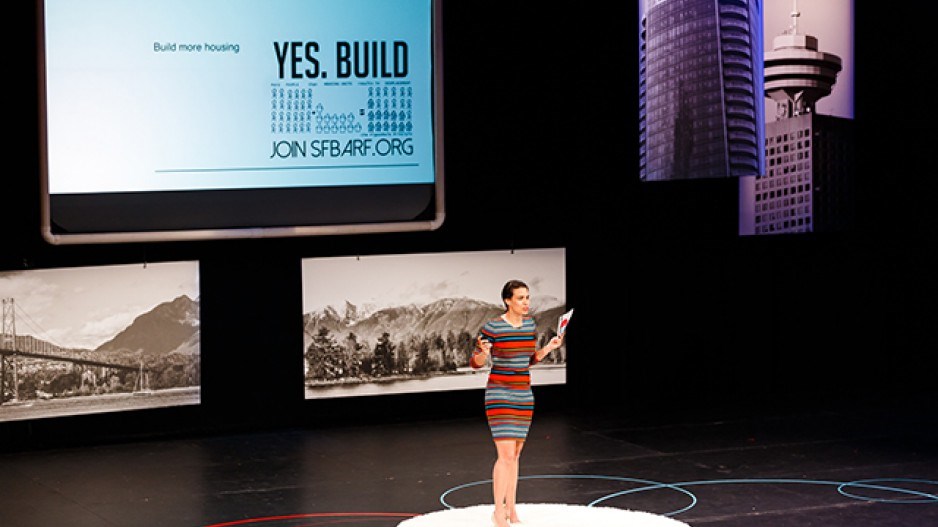Build more housing faster. That was the chorus from a trio of speakers at the recent RED (Real Estate Development) Talks in Vancouver that addressed solutions to Vancouver’s high housing prices.
San Francisco pro-development advocate Sonja Trauss said it doesn’t matter what kind of housing is built as long as there is more of it, and soon.
Truass, who founded the upstart, 500-member San Francisco Bay Area Renters’ Federation two years ago, said that, as in her high-priced city, Vancouver’s mandatory public hearing process used to decide density “is broken.”
“The people who live near a proposed new development are the last people who should be asked if they want higher density,” Trauss told the March 30 meeting. “You are guaranteed to get a ‘no.’”
Instead, Trauss, a renter, former math teacher and self-styled anarchist, tries to pack such meetings with those who will benefit from more housing: young people from other neighbourhoods who will actually buy or rent the new homes.
Her group has even sued San Francisco suburban communities that have failed to approve the housing they said they would.
Trauss said more supply is also the answer for Vancouver, whether it is luxury homes, highrise rentals or low-income housing.
“You have to support building, even when it’s a type of building you hate,” she said. “You really need everything right now.”
A recent RentCafé international survey found that San Francisco has the second-highest housing prices and the second most expensive rent in the U.S., at US$3,360 for a one-bedroom. The city also has the country’s second-highest homelessness rate with 795 homeless per 100,000 residents.
As a comparison, RentCafé, a subsidiary of Point2 Homes, ranked Vancouver at No. 24 out of 30 global cities for rent levels, with average rents of US$1,400.
(See also: Vancouver rent is expensive, but it’s reasonable for a financial centre, argues new report)
Vancouver has 2,100 homeless people, according to the newly released 2017 survey, representing about 30 homeless people per 100,000 residents.
Vancouver’s obsession with a “housing crisis” might be overblown, said RED speaker Steven Levitt, author and partner in Freakonomics.
“High housing prices because it is a beautiful city that lots of people want to move to is a pretty good problem to have,” said Levitt, who hails from Chicago. “In my city, the current crisis is the highest murder rate in the United States.”
Increasing the inventory, which should start by reducing the regulatory costs of building new homes, would likely be a simple fix for Vancouver’s housing problem, Levitt suggested.
Paul Kershaw, a University of British Columbia professor and founder of Vancouver’s Generation Squeeze, a lobby group for millennials and gen-Xers seeking affordable housing, said some progress has been made.
He cited the B.C. foreign-buyer tax, Vancouver’s recent vacant-home tax and the city’s proposal to allow older houses to be converted to multi-unit rentals as steps in the right direction.
Kershaw urged young people to “create a critical mass to provide political cover” for those advocating higher-density residential development.




